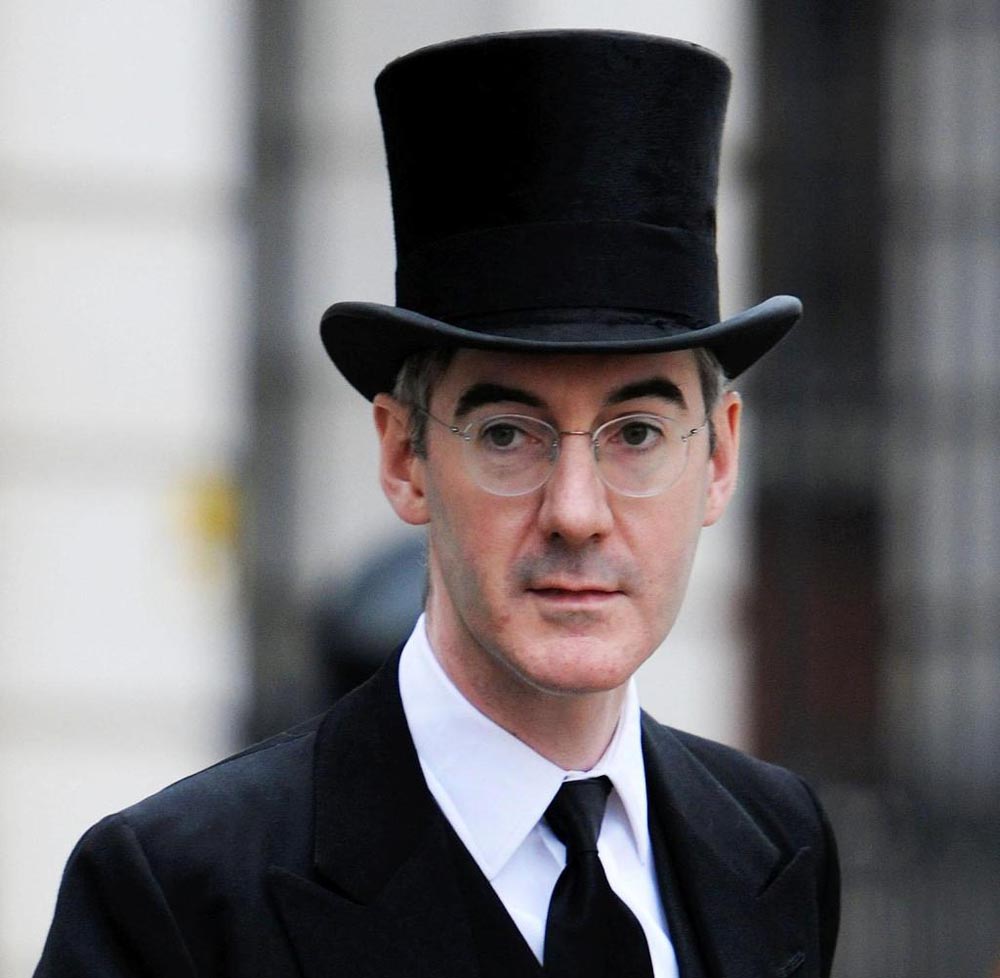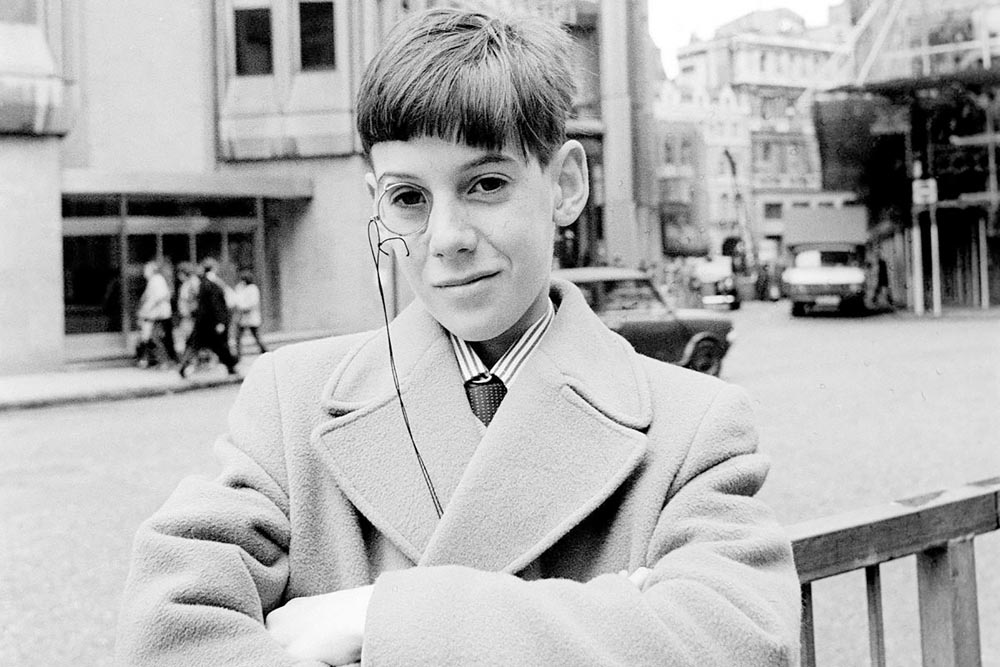
Like a stuffy English snob from a BBC period drama, Jacob Rees-Mogg is so posh, it’s as if he has been transported in time from a previous century. With his plummy accent, pronounced verbosity and astounding pomposity, the thought of Rees-Mogg becoming the UK Prime Minister is beyond the realms of even the most adventurous script writers, let alone in real life. How could the population relate to someone who seems so far removed from everyday reality? But then who believed that Donald Trump would become the President of the United States? So how has Jacob Rees-Mogg established himself as a political contender?
Written 8th October 2018
Too posh to rule?
For much of his political career, Rees-Mogg has been regarded as little more than an Parliamentary eccentric, viewed affectionately from both sides of the house. He was the Conservative Dennis Skinner, always ready for a sharp, biting quote, yet far enough from the corridors of power to seriously offend.
Rees-Mogg never disappointed, always ready and willing to live up to his upper-class stereotype, using obscure words that sent journalists scrambling for their dictionaries or historic references only understood by professors. He was famed for his skill at filibustering, where MPs block bills by talking for long enough to block the progress of a bill.
His Wikipedia profile details some of his idiosyncratic highlights: “In his long speech to filibuster the Sustainable Livestock Bill, he recited poetry; spoke of the superior quality of Somerset eggs, and mentioned the fictional pig, the Empress of Blandings, who won silver at the Shropshire County Show three years in a row, before moving on to talk about the sewerage system and the Battle of Agincourt.
“In a December 2011 debate on London Local Authorities Bill, he said that council officials with the power to issue on-the-spot fines should be made to wear bowler hats. In February 2012, he used the word “floccinaucinihilipilification”—meaning “the habit of considering as worthless”—during a parliamentary debate; it was noted as the longest word uttered on the floor of the House of Commons.”
In 1997, at the age of 26, in his first foray into politics, he stood as the Conservative candidate in the Labour stronghold of Central Fife. To the bewilderment of the locals, he campaigned with his nanny, driving around in an high-end Mercedes. Although Rees-Mogg at least had the sense to note that: “My Bentley would be most unsuitable for canvassing.”
Journalists, on visiting his home, note with amusement that his young boys are dressed formally in three-piece suits, looking like mini-adults rather than children. Jacob was similarly attired himself as a child.
He was born into the establishment. His father, Baron (William) Rees-Mogg was editor of The Times from 1967 to 1981, a member of the BBC’s Board of Governors and chairman of the Arts Council. William Rees-Mogg cut a traditional figure against the backdrop of a rapidly changing society, yet he famously criticised the sentencing of Mick Jagger to a year in prison for cannabis possession. In an editorial entitled “Who breaks a butterfly on a wheel?”, Rees-Mogg senior declared. “There must remain a suspicion in this case that Mr. Jagger received a more severe sentence than would have been thought proper for any purely anonymous young man.” Jagger was promptly released from jail.
The England of yesteryear is a foreign country
Rees-Mogg senior may have defended Mick Jagger, the strutting, drug-taking bad boy of the 1960s, but his offspring were never going to threaten the status quo. The young Jacob knew his own mind and was a confident child. At the age of ten, he became obsessed with stocks and shares after his father invested £50 left to Jacob in shares in the General Electric Company (GEC). By the age of 12 he was taking up his right, not just to attend shareholders meetings at GEC and Lonrho (which Jacob had by now invested in), but to stand up and cross-examine the chair of proceedings.
One of the earliest known interviews (possibly the first) with Rees-Mogg was by Vicki Woods for Tatler in 1985, who visited the 16-year-old at Eton. She recounted the story of the precocious young shareholder:
“In 1981, when Jacob Rees-Mogg was twelve, he attended a shareholders’ meeting of GEC, in which he held (at the time) 175 shares, and he told the chairman Lord Nelson that the dividend on offer was ‘pathetic’. This time the incident was more widely reported, partly because Rees-Mogg père had himself joined the board of GEC only minutes before Rees-Mogg fils started slagging off the chairman of the company, and partly because amused City editors had by now cued in their warmer-hearted, human-interest, star-columnist brethren. The schoolboy financier was a gift to such as these. Twelve-year-old worth £3,500! Jacob was photographed looking heart-breakingly young with huge brown eyes and was set upon by the likes of Jean Rook [The Daily Express columnist known as The First Lady of Fleet Street], who wrote that her grizzled old heart melted clean away when Rees-Mogg turned his eyes upon her.”
Vicki Woods’ initial exchange with Rees-Mogg is entertaining and revealing. The 16-year-old Rees-Mogg was just as pompous as the 2018 version nearing his 50th birthday:
“It wasn’t what you’d call a light-hearted chat.” writes Woods.
“Q: ‘How old are you, exactly?’
“A: ‘I am to the day exactly one hundred and fifty years older than Queen Victoria.’
“Q: ‘Wouldn’t you rather be at a Catholic school?’
“A: ‘Eton, although not a Catholic School, is of course a Catholic foundation dating from the fifteenth century and Catholics are rather well catered for. There is Mass every morning at 7.30 for those Catholics who are prepared to attend it, and on Sundays at ten forty-five.’
“Jacob has been interviewed so often that he thinks he’s learned the trick of it. He wore a dark suit, dark tie, white shirt, black brogues. He speaks sonorously and in paragraphs, nodding away like a Latin master and employing old-man’s tricks like peering over the top of one’s horn-rims and putting the tips of one’s fingers together.
“Q: ‘Do you always wear a suit?’
“A: ‘Oh, yes. Occasionally I wear a blazer and flannels.’”
Authenticity in the age of the fake
In a society where formality outside of the workplace has been extinguished and the flaunting of privilege is deemed taboo, a politician like Rees-Mogg should be extinct. But his influence has never been greater and the proud embrace of his background clearly appeals to many. His supporters see him as a refreshing anecdote to the blandness of the media-trained career politicians. What can be more boring than watching an MP on Question Time spending the whole hour avoiding saying anything that might cause controversy; the type where you can hardly work out which party they represent?
Class has been taboo in UK politics for over half a century. The concept of a ruling class running the government was swept away in the 1960s (or at least the perception of a ruling class), when the British decided they had enough of the stifling rules and officialdom passed down from above.
The last unreconstituted toff in number 10 was Sir Alec Douglas-Home, who’s year in power came between October 1963 to October 1964, after Harold Macmillan had called it a day. The Profumo scandal had shone a light on the behaviour of upper class, and how they would use their influence to cover their tracks, and the writing was on the wall.
The spell was broken and every Prime Minister from 1964 until 1997 was educated in the state sector, with Harold Wilson, Ted Heath and Margaret Thatcher all Grammar School pupils. It was not until 2010 that an old-Etonian returned to power, a remarkable fact as more than a third of all Prime Ministers had graduated from the ‘the nursery of England’s gentlemen’.
David Cameron may have been an old-Etonian, but he actively downplayed his privileged past and was keen to be regarded as a man of the people. A critical, unauthorised biography of Cameron was entitled Call me Dave, mocking his casual chumminess. Cameron had fielded a question on a radio show which asked how people addressed him. “Some people call me Dave,” replied the PM. Not quite a request for informality, but you could hardly imagine Rees-Mogg saying” “Some people call me Jake!”
Bagehot in The Economist describes the cult of Rees-Mogg: “He is more than just the leader of a faction or a cult. He is also the embodiment of the average Conservative Party member. A recent survey by Queen Mary University of London painted the fullest picture to date of Tory members. Some 44% are over 65 and 71% are men. They think austerity has been a good thing. They believe in traditional values and harsh prison sentences. They love Brexit—and not just any old Brexit, but the full-strength sort, leaving both the customs union and the single market.
“These activists put up with David Cameron, and his embrace of Notting Hill values, so long as he was winning. But their hearts lie with Mr Rees-Mogg, not just because they agree with his views but because they love his style.
He is the blue passport in human form, the red telephone box made flesh, the Royal Yacht Britannia in a pinstripe suit; a reminder of a world in which traditional Britons didn’t have to apologise for being who they were and bow before the gods of multiculturalism, feminism and health and safety.”
Rees-Mogg’s authenticity is beyond question, but many fear his undiluted, uncompassionate approach to politics. The writer Suzanne Moore has compared Rees-Mogg to Boris Johnson, Nigel Farage, and Donald Trump, noting that like them “he embodies the three things that many people require of modern politicians: a veneer of authenticity; an ability to cut through perceived liberal wisdom; and enormous privilege that is flaunted, rather than hidden.” Moore also suggests he uses his “religious faith” in an attempt to “excuse his appalling bigotry.”
Rolling back the years
Being the embodiment of a historic English gentleman has its charm and it is easy to observe him through nostalgic rose-tinted glasses. He is unfailingly polite and plays fair. When a protestor recently targeted his children, rather than use it to score political points, he was very quick to point out that it was a Class War anarchist rather than a Corbyn-supporting Labour Party member.
However, the England of yesteryear is a foreign country, with different moral codes, politics and prejudices. Could we really reject our modern ways and join Rees-Mogg into a journey into the past?
Rees-Mogg’s voting record places him firmly to the right of the party, and it is clear that he rejects the liberal consensus which has been widely accepted for the last fifty years.
The New Statesman’s Martin Fletcher writes: “Rees-Mogg has uncompromising views that extend far beyond Brexit. He opposes the 1998 Human Rights Act, gay marriage and all abortion, even in cases of rape and incest.
“… Rees-Mogg has opposed increases in welfare benefits, even for the disabled – ‘the safety net [has] become a trap’, he contends. He supports zero-hours contracts, arguing that they benefit both employers and employees. He backed the controversial ‘bedroom tax’ on council tenants deemed to be living in properties larger than they needed, and caused anger last autumn by appearing to welcome the fast-growing number of food banks.
“Rees-Mogg is also a climate change sceptic who opposes costly measures to reduce greenhouse gases. … And so the list goes on. He opposes foreign aid because “this is not the job of the government but ought to be a matter of private charity”. He regards fox hunting as “the most humane way of controlling the fox population”. He supports the sale of state-owned forests, the mass surveillance of communications on security grounds, and restrictions on legal aid. He opposes any more devolution of powers to Scotland and Wales.
“He wants tougher immigration and asylum rules, and is no fan of positive discrimination. In 2006, he resisted Cameron’s efforts to increase the number of Conservative parliamentary candidates from ethnic minorities (He argued that fulfilling quotas can often “make it harder for the intellectually able”).
“‘He had these sort of views when he was eight or nine. To still have them when he’s 48 seems to me to be pushing it a bit,’ Chris Patten, the former Tory chairman, fellow Catholic and old friend of Rees-Mogg’s family, told me. ‘I don’t think they have very much relevance to Britain’s problems in the 21st century, and the idea he could lead his party in this century is completely absurd.’”
It is telling that even his friends worry about a Rees-Mogg premiership, and much of the fiercest opposition (and adulation) comes from within the bitterly split Conservative Party.
Matthew Parris, the commentator and former Tory MP, wrote in The Times: “For the 21st-century Conservative Party Jacob Rees-Mogg would be pure hemlock. His manners are perfumed but his opinions are poison. Rees-Mogg is quite simply an unfailing, unbending, unrelenting reactionary.”
The most apt description of his politics is probably ‘High Toryism’ which is described as a traditionalist conservatism, usually at odds with the modernising elements of the Conservative Party. A “High Tory” will tend to have an appreciation of religion and high culture. They have historically been either a high church Anglican or traditional Roman Catholic, as well as a gentleman, and often an agrarian.
Catholicism above Politics
Rees-Moggs world view is drawn from his interpretation of faith. He makes no bones about where his loyalty lies. “I take my whip from the hierarchy of the Roman Catholic Church rather than the Whips’ Office,” he says.
His particular take on Catholicism is often too harsh for the cardinals. He was forced to resign as a director of the Catholic Hospital of St John and St Elizabeth in London by Cardinal Cormac Murphy-O’Connor in February 2008, after protracted arguments over the adoption of a tighter ethical code banning non-Catholic practices such as abortions and gender reassignment surgery at the hospital.
In 2013, Madeleine Teahan from the Catholic Herald interviewed Rees-Mogg to understand what the faith meant to him.
He told Teahan, “If it’s available I like going to the Extraordinary Rite… The more you go the more you will find that it is a good thing to go to. You get some time to think and it’s not all noisy – and there’s no risk of guitars. I think Mass can be too noisy and guitars should be banned. We have had an outbreak of guitars in Somerset and I find them disagreeable.”
On more serious matters, Rees-Mogg outlined his opposition to legalising assisted suicide as well as abortion: “It’s very easy to use the very troubling cases to allow for exceptional circumstances which you find, quite quickly, become the norm. And then people are pressurised into ending their lives early because they’re a burden on their families and so on.
“Whether our motives are religious or practical people who are nervous about euthanasia need to be very well prepared to stop that going exactly the same way as abortion, which went from being something specifically about the mother’s health to being a variant form of contraception.”
Rees-Mong traditionalism was emphasised when he proclaimed, “My great hero is probably Pius IX because of his traditional view of the state and the Church and his Syllabus of Errors was a clear view.” Pius was best know for his ruling of papal infallibility, i.e. the doctrine that the pope cannot err when he teaches in matters of faith or morals.
Rees-Mogg’s deference to the pope, doesn’t always sit comfortably when the hierarchy moves towards modern values.
“The difficulty with being a relatively High Church member,” says Rees-Mogg, “is that I have to accept what the Church does within its own ambit as a matter of its own authority and if it’s legitimate within the Church’s teaching, it’s not up to me to say whether or not they should do it.”
The arch Brexiteer
The connection to Rome doesn’t not extend to wishing to share the political system to which the city belongs. Rees-Mogg has come to prominence, above all, for his rigid insistence that the UK must leave the EU, as soon as possible, deal or no deal.
His rejection of the the EU is a lifelong crusade. The Economist’s Bageshot, writes, “He has served the longest apprenticeship in Eurosceptic thinking in British history. His late father, William Rees-Mogg, a former editor of the Times, was one of the founders of the movement. Sir William Cash, another Eurosceptic grandee, recalls tutoring the young Jacob in the cause. Now he is increasingly the movement’s public face, as the leader of the European Research Group, a caucus of Eurosceptic MPs.”
The worry is that so ingrained is his anti-Europeanism that he will push for the hardest of Brexit under any circumstances. One former Tory minister complained that, “He’s theologically opposed to having policy driven by evidence and facts, insisting that anyone who disagrees must be lying or relying on false information.”
Rather inconveniently his business interests don’t always match his pontificating. He co-founded Somerset Capital Management in 2007 and according to the register of MPs’ interests, he still he owns at least 15% of the company. The $10bn fund manager is managed via subsidiaries in the tax havens of the Cayman Islands and Singapore and deals in emerging markets (ie not Europe conveniently).
In 2018, Somerset Capital opened an investment fund in Dublin. A prospectus for the new business listed Brexit as one of the risks, as it could cause “considerable uncertainty”!
Rees-Mogg has often been tagged the ‘Honourable Member of the 18th Century’ but more accurately, Rees-Mogg is a throwback to the comforting certainties of the 1950s and early 1960s, the UK of Macmillan and Douglas-Home. During the Labour years of 1964-1970, to the abject horror of the God-fearing establishment, Home Secretary Roy Jenkins oversaw a series of legislations that changed the whole nature of UK society. He embarked on a series of reforms that caught the mood of the swinging sixties. He secured parliamentary time for private members’ bills to liberalise the abortion law and legalise homosexual practices between consenting adults. He also set in train a strengthening of race relations legislation and the abolition of theatre censorship. Given half a chance, Rees-Mogg would turn back the clock.
Rees-Mogg’s supporters look back mournfully on simpler times, best described by John Major as days with “long shadows on county grounds, warm beer, invincible green suburbs, dog lovers and pools fillers and – as George Orwell said – ‘old maids bicycling to holy communion through the morning mist’.” (Ironically Major used this speech as part of a pro-EU speech!).
But the 1950s were also days when landlords could put signs in their windows stating ‘No Irish, No Blacks, No Dogs’, when homosexuals were persecuted and imprisoned, when a woman’s place was in the home and women died in horrific back-street abortions.
Nostalgia has its place, and that is in cosy TV dramas on BBC on a Sunday night. We should learn from the past but look forward - and ignore politicians who try to convince us otherwise.
• Who is Ursula von der Leyen, the new European Commission President
• John Bercow - Parliament Defender or Brexit Blocker







